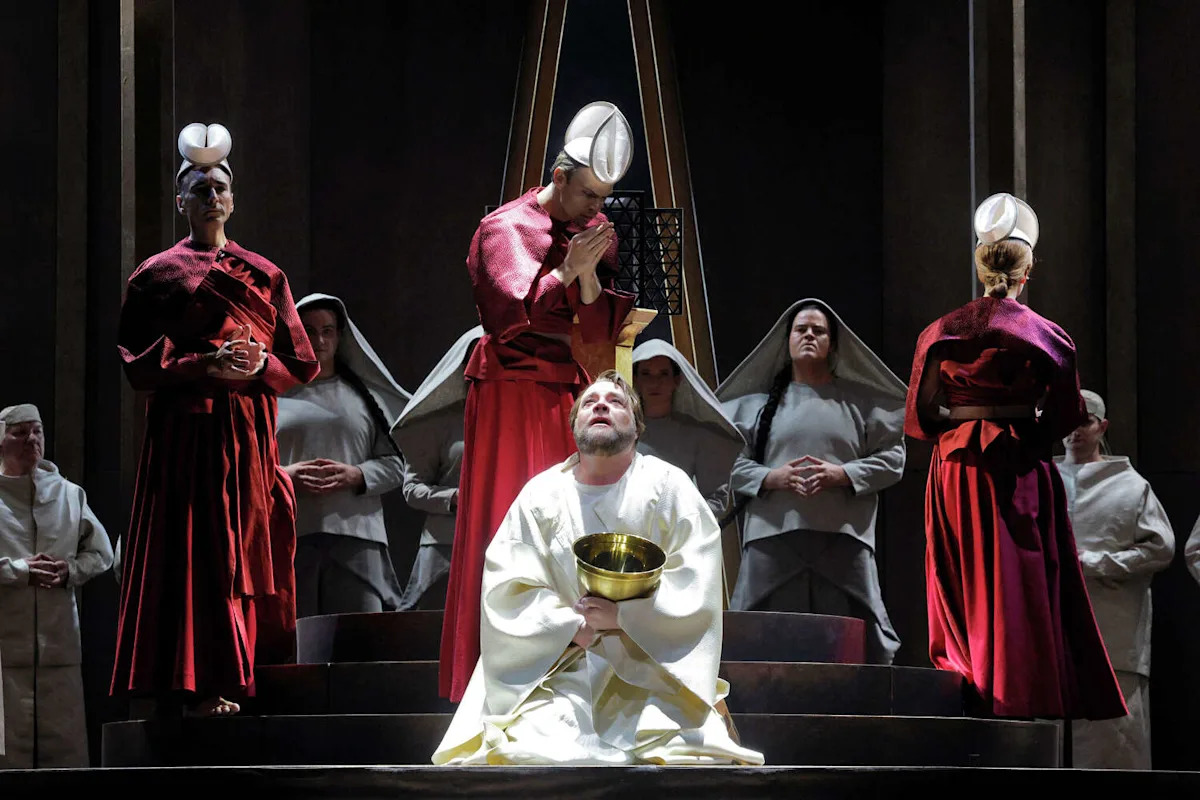Not five minutes after the curtain rises on the San Francisco Opera’s radiantly beautiful new production of Wagner’s “Parsifal,” director Matthew Ozawa offers the audience a single unforgettable stage image.
In the forest belonging to a knightly order that guards the Holy Grail, a few of the order’s young acolytes are revealed asleep on the ground. As the faint light of morning begins to peep through the trees, two of them, joined by a long single strand of braided hair, suddenly begin to levitate slowly off the ground. They remain stretched out horizontally in midair until they disappear up into the flies, whereupon the action begins.
Do we understand what this is supposed to signify? No. Will we have gained insight into the question when the final curtain drops five hours later? Also no. All we have is the tender, simple loveliness of the moment, and it’s enough.
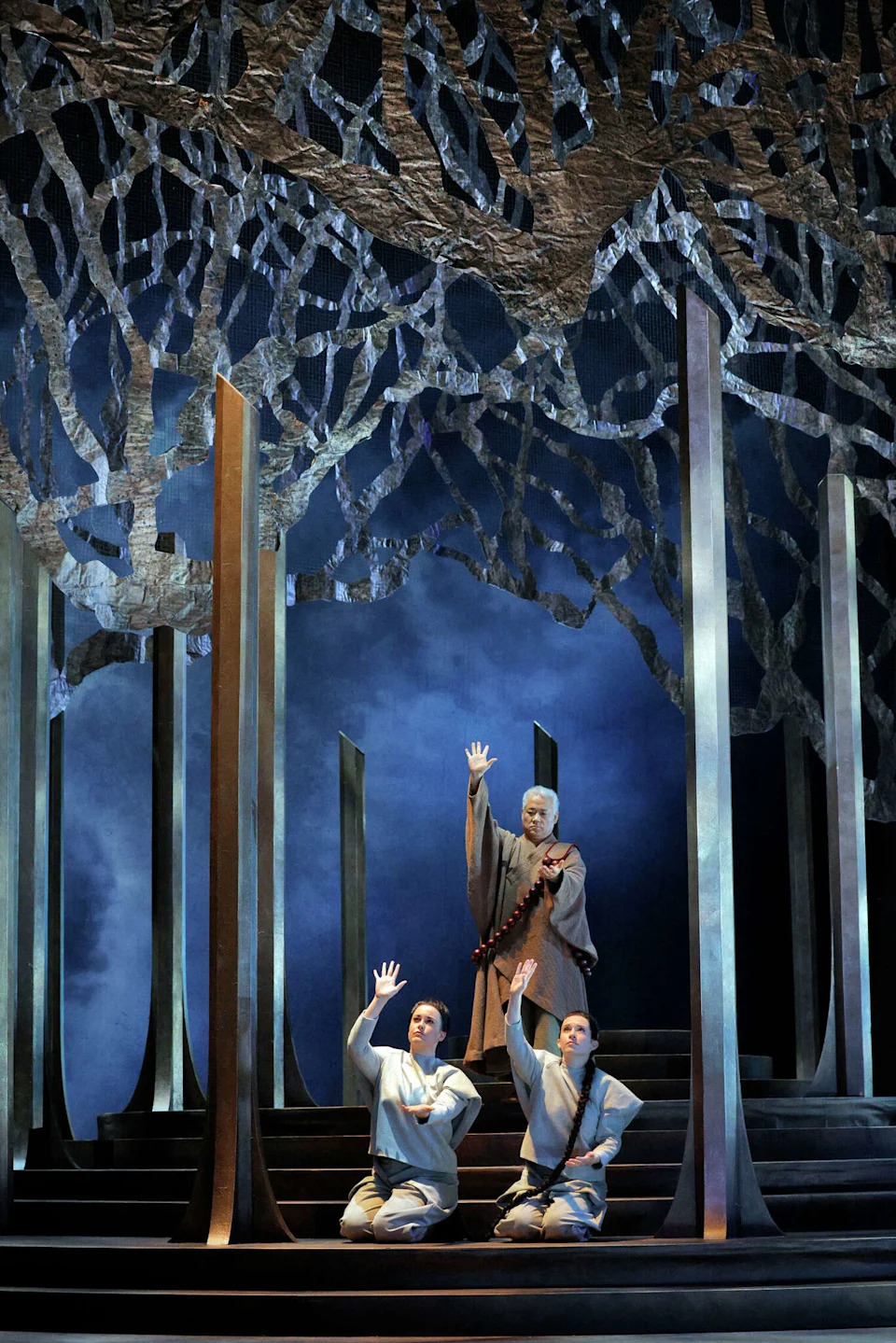
Kwangchul Youn as Gurnemanz, above, with Laura Krumm, below left, and Elisa Sunshine as Esquires in San Francisco Opera’s new production of “Parsifal” by Richard Wagner. (Cory Weaver/San Francisco Opera)
That initial ploy could stand in for the entire production, which opened at the War Memorial Opera House on Saturday, Oct. 25. In tackling Wagner’s final and most enigmatic operatic creation, the company has deftly bypassed all the piece’s most intractable challenges – its static dramaturgy, its talkiness, its indecipherable religious framework – and opted instead to dazzle the eyes and ears.
More Information
“Parsifal”: San Francisco Opera. Through Nov. 13. $35-$447. War Memorial Opera House, 301 Van Ness Ave., S.F. 415-864-3330. sfopera.com • Livestream available Nov. 3-5. $25. sfopera.com/digital/livestream
This, I think, is the correct “Parsifal” strategy. There’s no obligation to take seriously the opera’s air of sacramental mumbo-jumbo, with its babble about sin and redemption and purity, just because Wagner and his followers have done so.
Instead, the Opera has given its audiences what we need most. There’s a strong, almost flawless cast on hand, including tenor Brandon Jovanovich in the title role and the German mezzo-soprano Tanja Ariane Baumgartner in an electrifying company debut as the shadowy seductress Kundry. The visual aspects of the production are sumptuous and engaging. There are dancers, operating as part of the piece’s fluid, elusive world.
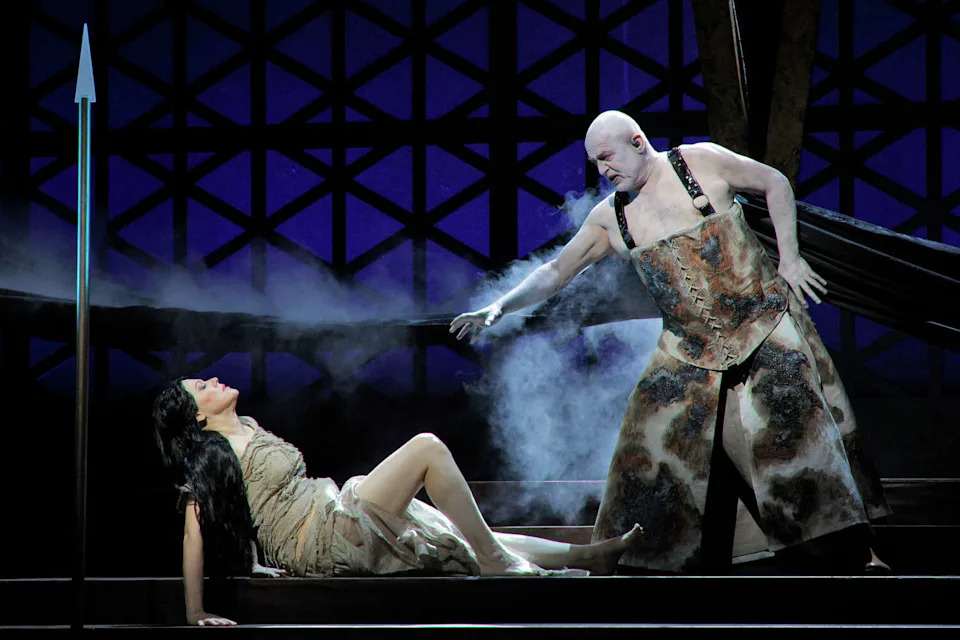
Tanja Ariane Baumgartner as Kundry, left, and Falk Struckmann as Klingsor in San Francisco Opera’s new production of “Parsifal” by Richard Wagner. (Cory Weaver/San Francisco Opera)
Perhaps most heartening for the company’s patrons, Saturday saw the latest Wagnerian triumph by Music Director Eun Sun Kim, whose approach to the composer’s titanic scores – a blend of heroism and probing intimacy – continues to pay dividends. Under her guidance, the Opera Orchestra mustered the gauzy delicacy that is the distinctive province of parts of the “Parsifal” score, as well as the supercharged orchestral rhetoric that registers as “Wagnerian” in any context.
Jovanovich’s success as Parsifal, the “innocent fool” whose naivete ultimately sets things right among the Grail-watchers, was practically foreordained. His Wagnerian track record in San Francisco (including appearances in “Die Walküre,” “Lohengrin” and “Die Meistersinger”) has consisted of a series of triumphs. But this role, with its unruffled nobility, may be the one best suited to his smooth-grained sound.
Baumgartner’s appearance, though, came as a thrilling surprise, a powerhouse combination of capacious high notes and theatrical urgency. Because Kundry spends much of Act 1 engaged in a sort of feral barking, it wasn’t until the more extended and demanding music of Act 2 that we got a full sense of the greatness of Baumgartner’s artistry; at that point, though, the performance surged to life.
The rest of the cast was no less impressive.
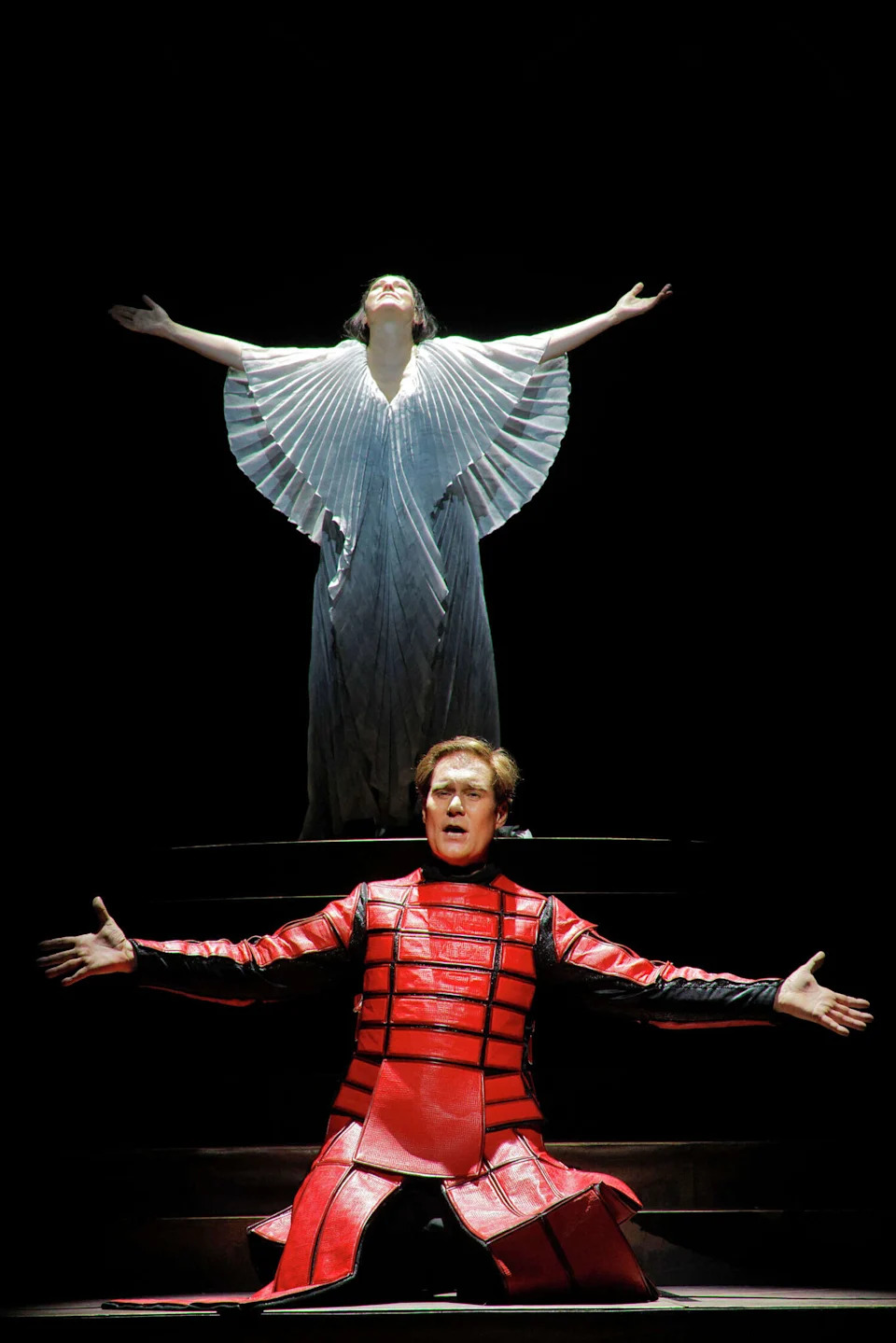
Tanja Ariane Baumgartner as Kundry, above, and Brandon Jovanovich as Parsifal in San Francisco Opera’s new production of “Parsifal” by Richard Wagner. (Cory Weaver/San Francisco Opera)
As Amfortas, the wounded ruler of the Grail, baritone Brian Mulligan sang courageously, letting us hear the chronic pain that undermines the character’s regal strength. Baritone Falk Struckmann contributed a brilliantly malevolent turn as the evil sorcerer Klingsor.
Bass Kwangchul Youn lacked something of the requisite vocal gravitas of the elder knight Gurnemanz, but he came through handsomely in the final act.
The Opera Chorus, led by John Keene, sounded alternately robust and seductive, as the moment demanded.
In addition to its musical rewards, this “Parsifal” was a cornucopia of visual delights. Robert Innes Hopkins’s sets, evocatively lit by designer Yuki Nakase Link, conjured up a range of magical, hard-to-place milieus, from woodlands to castles and beyond.
Jessica Jahn’s irresistible costumes included translucent blue, green and yellow outfits for Klingsor’s Flower Maidens, and elaborate white robes for the Grail’s knights that looked like whimsical blends from “The Handmaid’s Tale” and “The Seven Samurai.”
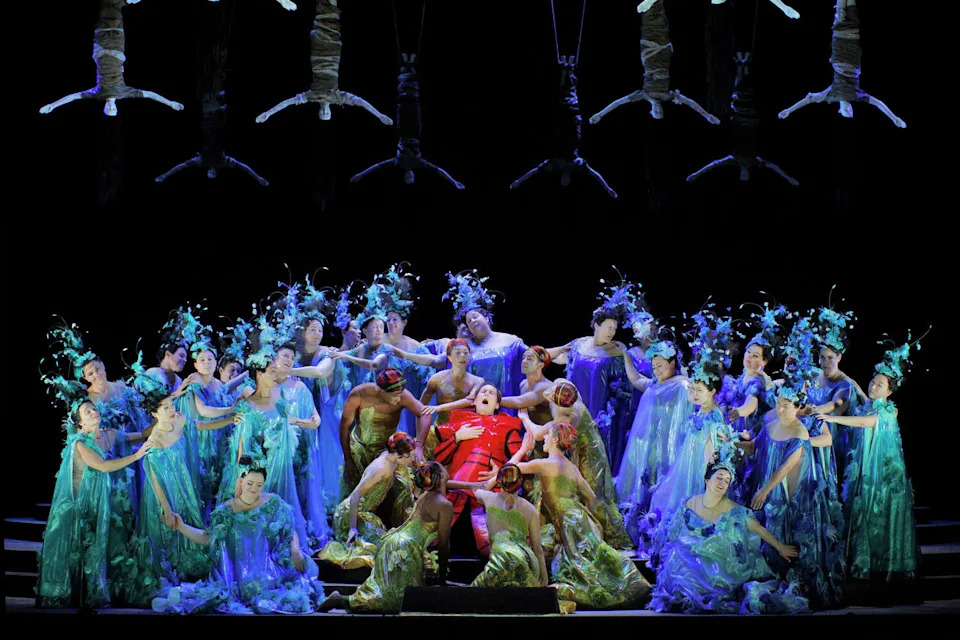
Brandon Jovanovich as Parsifal, center, in Act II of San Francisco Opera’s new production of “Parsifal” by Richard Wagner. (Cory Weaver/San Francisco Opera)
Choreographer Rena Butler, faced with the thankless task of introducing dance into scenes where it doesn’t obviously belong, rose superbly to the assignment with simple but elegant pirouettes and rounds. Ozawa’s staging allowed much of the action to unfold in a sort of rapturous haze, as if teetering on the brink between dreams and wakefulness.
It’s not the way we generally experience opera, but then again there’s a rapturous haze encoded at the heart of “Parsifal.” At the end of Act 1, following the ritual in which the Grail is uncovered and elevated, Gurnemanz asks Parsifal whether he understands what he has just witnessed. When Parsifal shakes his head in mute embarrassment, Gurnemanz replies, “That’s because you’re a fool.”
In that moment, Parsifal stands in for all of us.
Joshua Kosman is the Chronicle’s former classical music critic.
This article originally published at Forget the sacred mystery – San Francisco Opera’s ‘Parsifal’ is pure, dazzling spectacle.

